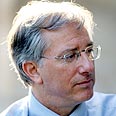
Ross: Put pressur on Syria
צילום: אלכס קולומויסקי
Ross: Deal with Syria using carrots and sticks
Former US envoy to Middle East writes in Washington Post article that 'history is full of good resolutions on Lebanon that have not been implemented because Syrians had power to block them.' He proposes putting international economic pressure on Damascus, while considering reopening talks with Assad in exchange for cutting ties with Hizbullah
WASHINGTON- Dennis Ross, who was a key figure in Bush Sr.'s and Clinton's government policy toward the Middle East wrote Thursday in an article in the Washington Post, "Syria sees Hizbullah as a card -- something to be exploited to make Syria a factor in the region or to be traded in the right circumstances."
"That price could be a joint French-EU and American effort to isolate Syria economically if it is unwilling to end its material support for Hizbullah," he said.
Ross, who was personally involved in arriving at an understanding to bring about the end of the two confrontations between Israel and Hizbullah in 1993 and 1996, said that the path to applying the resolution runs through Damascus: "Both times, to bring about an enduring ceasefire, we needed to deal with Syria. Implementation of this resolution will depend to a large degree on the Syrians -- unless, of course, the new international force deployed with the Lebanese army can both prevent resupply to Hizbullah and bolster Lebanon's military so it can fulfill the role envisioned for it in the resolution."
Ross wrote that the multinational force will be capable, in theory, to prevent arms smuggling from Syria, to deploy south of the Litani, and to prevent the return of Hizbullah to the region, but in practice – because of the haste in which the force was assembled – there is good reason to believe that it will fail from the outset.
"The implementation of the letter and the spirit of the resolution will also depend on the Lebanese government and army. Both institutions remain fragile, and Syrian opposition could exploit ongoing sectarian differences. With the international community ready to bolster the Lebanese government with forces and reconstruction assistance, there has never been a more promising moment for the Lebanese to act on their national obligations. History is full of good resolutions on Lebanon that have not been implemented because the Syrians had the power to block them," Ross emphasized.
The stick – sanctions; the carrot – talks with Washington
Europe is very critical to Syria today. Ross reminded, "French President Jacques Chirac could credibly warn Assad that if arms flow to Hizbullah and threaten French troops, then Europe will cut all economic ties to Syria. Conversely, if Syria ended its military relationship with Hizbullah and accepted the Lebanese government's effort to reestablish its authority, the European Union could promise new and meaningful economic benefits to Damascus."In this context, Ross wrote that sticking a wedge between Syria and Iran couldn't occur unless the Americans go back to talks with Syria. In his opinion, the US needs to threaten Syria with the Syrian Accountability Act passed by Congress, stipulating that companies and institutions that have a financial relationship with Syria, cannot do business with the US.
He elaborated, "This would have the potential of choking off European, Asian (and even Arab) countries and businesses from having any commercial or investment relations with Syria -- and it could be devastating for an already weak economy."
The Syrians, Ross wrote, will want to know what they could gain from cutting off ties with Hizbullah: "They should be told that the page can be turned in our relations, that economic benefits could be forthcoming, and that even a resumption of the peace process between Syria and Israel on the Golan Heights could be in the offing."










